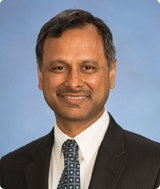
Manish Gupta
Director, Google Research
India
Topic: Title: Transforming Healthcare via Artificial Intelligence
Dr. Manish Gupta is the Director of Google Research India, a new AI research lab recently announced by Google. He holds an additional appointment as Infosys Foundation Chair Professor at IIIT Bangalore. Previously, Manish has led VideoKen, a video technology startup, and the research centers for Xerox and IBM in India. As a Senior Manager at the IBM T.J. Watson Research Center in Yorktown Heights, New York, Manish led the team developing system software for the Blue Gene/L supercomputer. IBM was awarded a National Medal of Technology and Innovation for Blue Gene by US President Barack Obama in 2009. Manish holds a Ph.D. in Computer Science from the University of Illinois at Urbana Champaign. He has co-authored about 75 papers, with more than 7,000 citations in Google Scholar (and an h-index of 46), and has been granted 19 US patents. While at IBM, Manish received two Outstanding Technical Achievement Awards, an Outstanding Innovation Award and the Lou Gerstner Team Award for Client Excellence. Manish is a Fellow of ACM and the Indian National Academy of Engineering, and a recipient of a Distinguished Alumnus Award from IIT Delhi.
Abstract:
We describe a clear need to transform healthcare systems across the world to achieve better
health outcomes at affordable costs and additional challenges in countries like India of an
acute shortage of doctors. We argue that this transformation is possible through a
combination of a patient-centric approach and proactive care enabled by artificial intelligence
(AI). We present examples of machine learning techniques to support more proactive care at
various tiers of healthcare systems, including ICUs, secondary and primary healthcare
centers, and more importantly, at home or work. In particular, we present our team's work on
diabetic retinopathy screening using a convolutional neural network based approach and
newly initiated work on preventing and managing cardio-vascular disease through lifestyle
modifications and early medical interventions. We also describe our work with an NGO,
ARMMAN, to improve maternal and child health. Finally, we describe several outstanding
challenges that need to be overcome in order to achieve meaningful impact in the real world.
